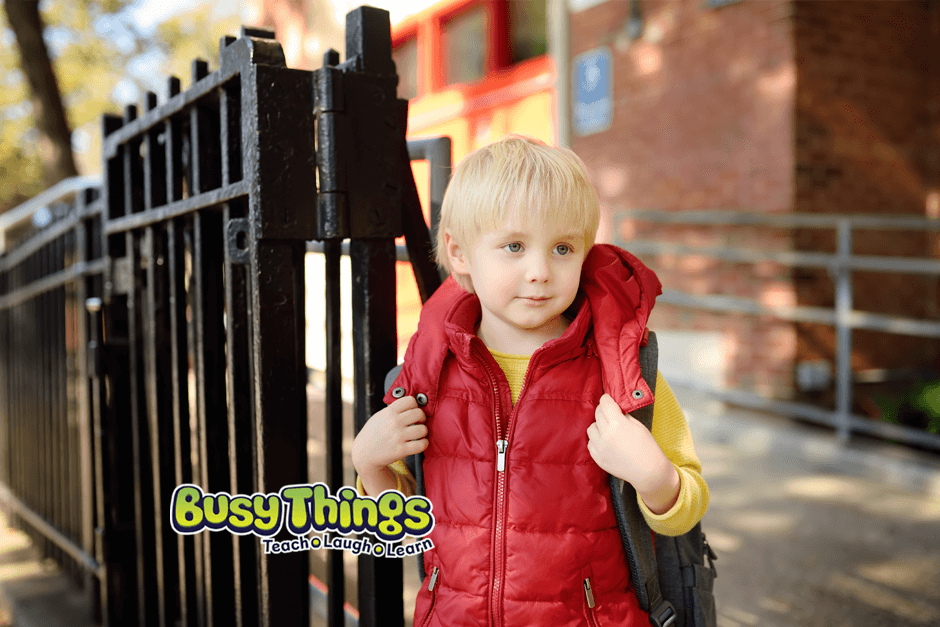Your First Day at School Checklist

The first day at school brings with it a certain nervous excitement. It’s something that you’ve been building up to for a long time. Everyone wants the day to go really well. And it can, with a little bit of planning and forethought, so you’re able to head off any traumas before they escalate.
Here are our top tips to make your child’s first day at school as memorable as possible for all the right reasons!
1. Practise your routine
Most children will be used to saying goodbye to their parents each morning from their nursery days, but even the most confident child can be unsettled when the routine and faces around them change.
Use the few days before school starts to get your child used to the school routine. Get everything ready the day before so their uniform, school shoes, and book bag are all ready to go. Have a consistent bath time, bedtime and morning routine, and ensure you’ve practised walking down to school so that you’ve plenty of time to get there.
If you are worried that your new starter will miss you during the day, you could draw a heart on your and your child’s hand in felt-tip, so that it won’t wash off. You can then place the hearts together as you say goodbye and, should your child feel lonely during the day, they can look at the heart on their hand and feel the connection. It’s a simple, sweet thing but comforts many children.
2. Set expectations
Talk your child through the day (or part day) so that they know what to expect. Don’t worry if you don’t know everything that will happen, if it’s just activity-playtime-activity-lunch-activity-story-home time, that still gives the child an idea of what’s to come. The BBC has a great interactive game, which will help your child understand some of things they might do. Check it out here: BBC My First Day At School.
Stress the really exciting things about the day, like seeing children they know and making new friends. And, if they ask what you’ll be doing, make sure you describe a really unappealing day to them, so that they’ll be glad they’re not sharing it with you!
Last but not least, make sure they know that all the adults are there to help them, so that they are not afraid to ask should they need anything, and that you (or whoever is picking them up) will be there waiting to pick them up from the door when the home time bell rings.
3. Keep a memento
The first day at school is a day that is recalled time and time again. If you’re like most parents, you’ll take a photo every September to capture what they were like in each year. And inevitably on their last day at primary school, you’ll compare how they left to how they were when they started.
On the first day, make sure you’ve a couple of extra minutes to create your keepsake, be that the traditional picture by the front door or some of the alternatives The School Run has collated.
4. Arriving and walking in
In an ideal world, it’s great if you and your child can walk to school with another new starter. You can share what you’ve done earlier in the day and chat while you walk. It’s good too if you can point out other people you recognise on the way down or in the playground, so that school feels like the ‘place to be’ and, although unavoidably strange, it’s filled with familiar faces.
Don’t worry if you don’t know anyone. You won’t be the only one. Be open to starting a conversation with other families, or simply spend the time pointing out interesting things to your child to pass the few minutes before school starts.
When it comes to going in, make the handover as quick and positive as possible, and try to avoid going into the building itself. Keep your voice light and wish your child a wonderful day. The teaching team will be on hand to ensure the children know where to put their coats and bags, so don’t worry about that.
Most schools discourage playthings from home but if your child insists on taking a favourite toy or muslin in, don’t worry, they’ll understand if they’re needed on Day 1. If they do wobble, don’t worry, this is a big day for them. It doesn’t mean it will always be like this. Stay strong and measured, and just think about what you do to improve tomorrow. The teaching staff will be there to help and will soon start to know which children need extra encouragement to go in.
5. At the end of their first day
However the first day went, make sure you reward and encourage your new starter for the effort they’ve made and their successes during the day. You may not get much information out of them about what they did and they may be very tired but finishing the day with some kind of treat will help them remember the day positively. Give them, and you, some time to relax and do the things they enjoy before you get ready for tomorrow!
More starting school support…
This blog is the fifth and final blog in our ‘Starting School’ series. Read the others here: Starting School: Hints and Tips, Starting Primary School: Skills to Encourage, Is Your Child Ready for School, Emotionally and Socially? and Getting Ready for School: A Parent’s Guide.
We hope our starting school hints and tips blog has been useful! Please do let us know what you think in the comments and if you have any further ideas to share…